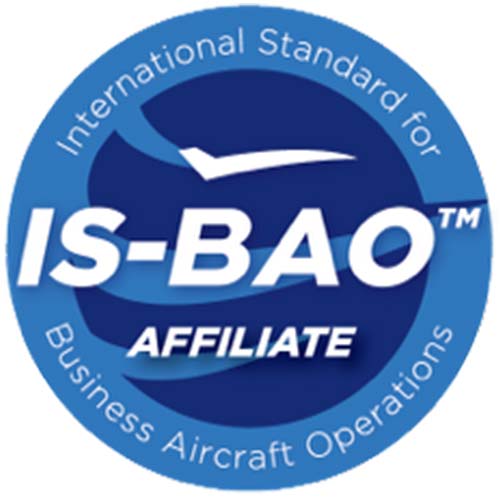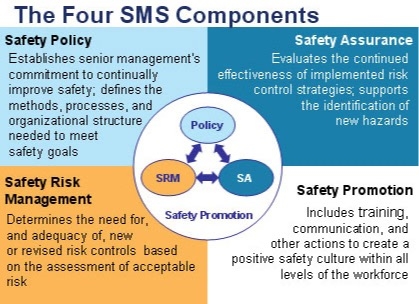Safety Management Systems (SMS)
The Southern California Safety Institute is honored to be working with The Business Aviation Safety Consortium (BASC) in bringing pragmatic and highly relevant training opportunities to the BASC Nation. Education is one of BASC’s core pillars, focused on addressing real-world operations and delivering solutions that can be directly applied to everyday challenges. By engaging with leading experts in aviation safety and training, BASC continues to provide meaningful resources that strengthen knowledge, sharpen skills, and foster a proactive culture of safety across the business aviation community. BASC members enjoy a 10% discount on course tuition.
Our certificate in Safety Management Systems (SMS) will provide your organization with the capability to implement and mature your SMS in accordance with the international standards established by ICAO and IBAC.
In today’s busy world with challenging workforce issues, you may need help getting through the six-step process to your IS-BAO registration. Or maybe you are ready to move up to Stage 2 or 3 but need some consultative support to help you accomplish your goals.
The IS-BAO Programme Support Affiliate (PSA) can help you get there! SCSI has been vetted by IBAC and the IS-BAO Standards Board so you can be assured of quality support from knowledgeable professionals.
The Programme Support Affiliate (PSA) was designed to identify vendors who actively support business aviation operators and ground handlers with implementing, seeking registration to, or maintaining registration to the IBAC International Standards (IS-BAO and IS-BAH).
IBAC has redesigned this affiliate programme to recognize exceptional businesses that actively assist organizations with improved and more effective safety standards in the context of an IBAC International Standards programmes.
IS-BAO and IS-BAH PSA vendors are required to demonstrate their ability to positively support the programme during initial application and any renewal of affiliation.
The goal of the PSA programme is for IBAC to provide a validated list of third-party vendors that will support organizations seeking to implement the IBAC Standards Programmes through to registration.



SCSI has been teaching SMS since 2002 and has tracked the changes and lessons learned as SMS has been implemented in aviation settings around the world. SCSI teaches based on the latest developments and guidelines published by ICAO and the various regulatory agencies. This certification is based on the latest ICAO Safety Management manual (Doc 9859 4th edition dated 2018) which supersedes the third edition published in 2013. It also supersedes the ICAO Accident Prevention Manual (Doc 9422), which is obsolete.
Starting in 2009, all member States of ICAO and all aviation service providers within those states must implement a safety management system that as a minimum:
- Proactively identifies safety hazards
- Ensures the implementation of remedial action necessary to maintain agreed safety performance
- Provides continuous monitoring and regular assessment of the safety performance
- Seeks continuous improvement in the overall performance of the safety management system
Starting in 2015, the United States Federal Aviation Administration required all Part 121 operators to develop and implement an SMS.
Required Courses
Safety Managers Course (SMC) . This course presents and discusses the organizational components of an SMS and the SMS Risk Control Process to safety professionals who may know nothing about Safety Management Systems, or those who may simply want to review their SMS and make sure all the pieces are in place. Toward that end, the course shows attendees how to do a "Gaps Analysis" which focuses on how to discover any Gaps in your current SMS and Risk Control Process.
Safety Risk Management ( SRM ) . Safety Risk Management is designed for those who already have an understanding of SMS and what to delve more deeply into the Risk Management and Safety Assurance components of an SMS. As an integral and required part of a Safety Management System, Safety Risk Management introduces a logic-driven process to analyze the degree of risk associated with identified hazards, recommending Risk-based solutions, and monitoring the effectiveness of these solutions.
CHOOSE THREE ELECTIVEs (ALL COURSES available by contract as well).
Human Factors in Accident Investigation ( HFAI ) Human error is implicated in most, if not all, aviation accidents. Accident investigators, therefore, need information, tools, and procedures to discover the role human error has played in an accident/incident being investigated. This course teaches the required material for investigators (a) to identify the human error issues involved in an accident wherever they occurred (e.g., in the cockpit, ATC, management, maintenance, etc.), and (b) to know when and how to call on the required Human Factors experts for further analysis.
Investigation Management (IM). This course is a unique, practitioner-oriented course in the field of aircraft accident investigation and prevention designed for a wide range of government and industry aviation safety investigators and managers. It is designed specially for those who will be investigators in charge (IIC) or who will have to manage or participate in accident investigations in a variety of settings and situations ranging from small local accidents to large international settings.
Emergency Response & Family Assistance Planning (ERFA). This course combines the aspects of emergency response and family assistance that your aviation organization must understand and comply with. Both civil and military content is woven into the subject material. This course will present the essentials of accident response planning to include setting up a response team to cover all aspects of accident response including care of survivors and families of victims.
Aircraft Accident Investigation (AAI ) . In this course you will become familiar with the methods, techniques, and requirements for investigating, and reporting aircraft accidents applicable to ICAO Annex 13 states. Once you understand the reporting requirements, you will learn how to comply with the responsibilities to preserve and interpret evidence to the investigation. You will learn how to set up an interim response team that will collect and preserve evidence. You will learn what evidence to preserve and how to preserve it. You will also learn about the hazards at an accident site and how to protect yourself and your team.
Aviation Maintenance Investigation (AMI) . The principles and techniques discussed in this course are applicable to all branches of aviation, including commercial operations, the military, and general aviation. While this course is primarily concerned with larger commercial operators, almost all the principles, lessons and examples are directly transferable across the spectrum of aircraft operations. The course's primary elements include maintenance principles, investigative techniques and development of corrective actions. These elements are reinforced with actual incident and accident examples and case studies.
Helicopter Accident Investigation (HAI) . Helicopter accidents provide many new challenges for the investigator principally because of the dynamic factors involved in helicopter performance and system design. Knowledge and experience in fixed wing aircraft accident investigation does provide a basic reference since most systems found on helicopters are similar to those found on fixed wing aircraft. There are however some very distinct differences. Most unique are the rotor systems and the aerodynamics of rotary wing flight. These are the focuses of the Helicopter Accident Investigation Course. The course assumes a basic knowledge of aircraft accident investigation. The instruction leads you through examples of the unique aspects of helicopter operations. There is a discussion of helicopter aerodynamics as they relate to accidents. You will learn about Ground Resonance and Dynamic Rollover. You will be introduced to the problems of Settling Under Power and Vortex Ring State and examine Human Factors involving helicopters.